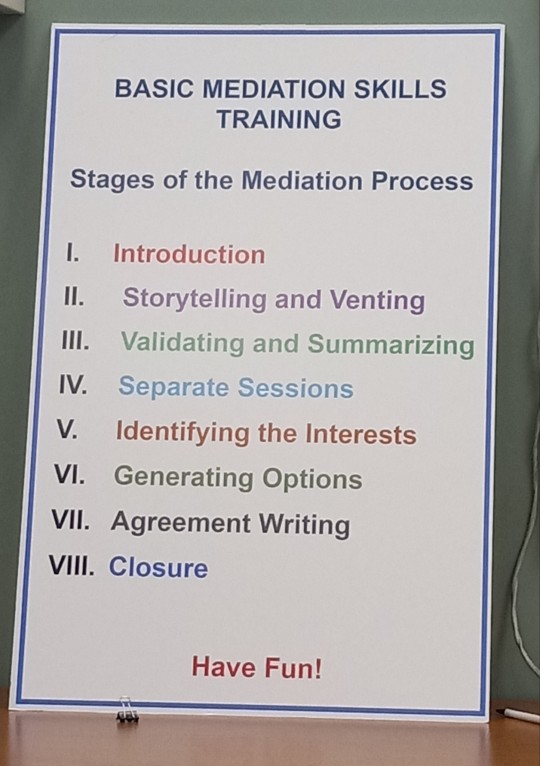#alternative dispute resolution
Text
Pre-Action Protocols, Expert Evidence, and Alternative Dispute Resolution: A Guide to Efficient Legal Dispute Management
Paragraph 6 of the Pre-action Conduct of all proceedings confirms that if a relevant pre-action protocol exists, parties are required to follow it before initiating legal action. This ensures that both sides take certain preliminary steps, such as sharing information and exploring potential settlements, to possibly resolve the dispute without court intervention. If no specific protocol applies,…

View On WordPress
#Arbitration#Mediation#ADR#alternative dispute resolution#claimant responsibilities#cost-sharing#court procedures#CPR 35.4(1)#defendant responsibilities#dispute resolution#efficient dispute resolution#expert evidence#joint expert instruction#key documents exchange#legal compliance#legal costs#legal dispute management#legal dispute preparation#legal guidelines#legal transparency#litigation#negotiation#pre-action protocols#settlement options
0 notes
Text
Arbitration lawyers bring expertise and strategic approaches to conflict resolution, essential for businesses seeking successful outcomes.
#arbitration and dispute resolution#arbitration agreement#dispute resolution#alternative dispute resolution
0 notes
Text
issuu
#Alternative Dispute Resolution in india#Alternative Dispute Resolution#Online ADR#Online ADR Platform
0 notes
Text
Rise in Businesses' Disputes with HMRC
In the intricate landscape of the UK’s taxation system, mid-sized firms find themselves entangled in a web of disputes with the tax authorities. According to a recent survey conducted by BDO, a prominent consultancy firm, over 61% of the 500 surveyed companies are currently embroiled in tax disputes with Her Majesty’s Revenue and Customs (HMRC). This escalating trend sheds light on the challenges…

View On WordPress
#Alternative Dispute Resolution#First Tier Tax Tribunal#HMRC#HMRC appeal#HMRC Tax Disputes#Resolving HMRC Tax Disputes#Tax Disputes#Tax Evasion#VAT
0 notes
Text
Business urged to avoid ‘destructive’ Covid-19 disputes
The Practice Direction on Pre-Action Conduct and Protocols highlights the need to actively consider ADR (usually mediation), and treat litigation as a “last resort”. There are several recent cases that say that a party, even if it is successful at trial, will suffer a costs penalty if it doesn’t engage in mediation. To know more details visit https://rogerlevittmediation.co.uk/business-urged-to-avoid-destructive-covid-19-disputes/

0 notes
Text
Day 52
September 23, 2022

Up at 5:00, our by 6:00 for the drive to the Alternative Dispute Resolution training in Emmitsberg, Maryland. This was a training based around formal role-playing. Those who participated in the role-play were split into pairs in separate rooms, and each given one of two roles. A pair of mediators and one or two observers were also assigned to each room.
I volunteered to role-play and was given the role of an employee who was requesting additional sick days due to chronic illness, while another teammate was assigned the role of my boss who wanted me to do my job. The mediators were neutral and walked us through the mediation process until we came to a realistic solution on our own terms. The role-play both functioned to introduce us to FEMA's Alternative Dispute Resolution services and to test the mediators (they did well and passed). I might write more later, but my hand/wrist still isn't 100%, so here's an outline of the process:

Our team leader informed us afterward that we are being deployed to Puerto Rico for Disaster Survivor Assistance. We leave on Wednesday. I'm apprehensive but overall pleased to be done with this project at headquarters and get out there to do something more obviously beneficial.
0 notes
Text
#inside stories#expert advice#navigating the process#divorce process#legal guidance#alternative dispute resolution#child custody#division of assets#legal ethics#financial aspects of divorce#divorce lawyer
0 notes
Text
NON-ARBITRABLE CASES
Introduction
Alternative Dispute Resolution as a means of settling disputes out of court is gaining precedence across the world. Most disputes that arise may be resolved through methods such as arbitration, conciliation and mediation services amongst alternative options of redressal. However, there are certain classes of disputes that cannot be resolved as easily. They are non-arbitrable in the sense that requisite authority has not been provided under the law to resolve them privately. For instance, Section 2(3) of the Arbitration Mediation and Conciliation Act, 1996 (“A & C Act) ousts the jurisdiction of arbitral tribunals wherein the laws in force provide that the particular dispute is not arbitrable.
Non-arbitrability
At first glance it might seem that this is in direct contrast with the terms agreed upon in the New York Convention and UNCITRAL Model Law since the objective of the Convention is to arm arbitration as a method and ensure the enforceability and execution of arbitral awards across multiple jurisdictions. Therefore, it could be concluded that non-arbitrability clauses in Indian law are not compliant with this objective.
However, it should be noted that Articles 34 and 36 of the UNCITRAL Model Law on International Arbitrations provides that no arbitral award shall be recognized or enforceable in states where the subject matter of arbitration is not capable of being settled out of court or if the award is against the public policy of such state. The same words have been reiterated by the A&C Act, 1996 under sections 34 (2) and 48(2). The law, both international and domestic, is thus clear that not every issue may be arbitrable and that arbitral awards may be set aside in accordance with the laws of that country.
What constitutes the non-arbitrability of a particular class of issues?
The A&C Act, 1996 in its entirety does not provide for the class of issues that are non-arbitrable. This has been determined by judicial precedents and other special statutes. Two cases hold the field and provide the necessary guidelines to determine the arbitrability of a case. They are –
Booz Allen & Hamilton Inc v SBI Home Finance Ltd, (2011) 5 SCC 532
Vidya Drolia and others v Durga Trading Corporation, (2021) 2 SCC 1
It may be useful, in this context, to understand the scope of the rights available to parties in regard to disputes. These are as follows:
a) Rights in Rem
b) Rights in Personam
Right in rem is a right the person exercises against the world at large while right in personam is a right that is exercisable only against specific person/s.
Any case that involves an element of right in rem is generally non-arbitrable and by default, taken up by the public fora. The types of remedy involved are not those which an arbitral tribunal is empowered to give. On the other hand, rights in personam are enforceable only against certain people, and are civil in nature; hence, these are amenable to arbitration though this is not a rigid or inflexible rule.
Booz Allen & Hamilton Inc v SBI Home Finance Ltd
The case is foundational to the development of the parameters of non-arbitrability of disputes and the Supreme Court laid down general rules in this regard.
The Court discussed the three facets of arbitrability relating to the jurisdiction of the arbitral tribunal herein:
i) whether the disputes are capable of adjudication and settlement by arbitration? That is, whether the disputes could be resolved by a private forum chosen by the parties (the arbitral tribunal) or whether they would exclusively fall within the domain of public fora (courts)
(ii) Whether the disputes are covered by the arbitration agreement? That is, whether the disputes are enumerated or described in the arbitration agreement as matters to be decided by arbitration or whether the disputes fall under the `excepted matters' excluded from the purview of the arbitration agreement.
(iii) Whether the parties have referred the disputes to arbitration? That is, whether the disputes fall under the scope of the submission to the arbitral tribunal, or whether they do not arise out of the statement of claim and the counterclaim filed before the arbitral tribunal.
The Court also pointed out that adjudication in certain categories of cases were reserved for public fora exclusively as a matter of public policy. Other categories of proceedings, though not reserved exclusively for adjudication by public fora including courts and tribunals, may, by necessary implication stand excluded from the ambit of private fora. Furthermore, the Court added, subordinate rights in personam arising from rights in rem have always been considered to be arbitrable and hence may form one of the exceptions to the above.
The class of cases that cannot be arbitrated, as cited by the court in this case, includes-
(i) disputes relating to rights and liabilities which give rise to or arise out of criminal offences;
(ii) matrimonial disputes relating to divorce, judicial separation, restitution of conjugal rights, child custody;
(iii) guardianship matters;
(iv) insolvency and winding up matters;
(v) testamentary matters (grant of probate, letters of administration and succession certificate); and
(vi) eviction or tenancy matters governed by special statutes.
In A. Ayyasamy vs A. Paramasivam & Ors, J. D. Y. Chandrachud commented that there are classes of disputes which fall within the jurisdiction of special fora created under legislation which exclude the jurisdiction of the ordinary civil court.
Vidya Drolia and others v Durga Trading Corporation
In Vidya Drolia, while coming to an understanding of whether arbitrability can be analyzed by the Courts under Section 8 or 11 of the Act, J. N.V. Ramana, in agreement with J. Sanjiv Khanna held that Sections 8 and 11 of the Act have the same ambit with respect to judicial interference i.e. scope of judicial review and jurisdiction of the court is identical but extremely limited and restricted.
Subject matter arbitrability cannot be decided at the stage of Sections 8 or 11 of the Act, unless it’s a clear case of deadwood. The restricted and limited review is to check and protect parties from being forced to arbitrate when the matter is demonstrably ‘non-arbitrable’ and to cut off the deadwood.
The scope of the Court to examine the prima facie validity of an arbitration agreement includes only: a. Whether the Online arbitration agreement was in writing? or b. Whether the arbitration agreement was contained in exchange of letters, telecommunication etc? c. Whether the core contractual ingredients qua the arbitration agreement were fulfilled? d. On rare occasions, whether the subject matter of dispute is arbitrable?
The Court, under Sections 8 and 11, has the power to refer a matter to arbitration or to appoint an arbitrator, as the case may be, unless a party has established a prima facie (summary findings) case of non-existence of valid arbitration agreement.
The Court has the power to refer a matter if the validity of the arbitration agreement cannot be determined on a prima facie basis, as laid down above, i.e., ‘when in doubt, do refer’.
The Court may interfere at the Section 8 or 11 stage, as little as possible, when it is manifestly and ex facie certain that the arbitration agreement is non- existent, invalid or the disputes are non-arbitrable, though the nature and facet of non-arbitrability would, to some extent, determine the level and nature of judicial scrutiny.
In conclusion
Taking into consideration the aforementioned aspects, the Apex Court has provided much-needed clarity into the classes of cases that are not arbitrable and provided suitable reasons for the categorisation. Even though ADR is a powerful tool for those seeking dispute resolution, not every case is arbitrable because of the inherent nature of the rights, procedures and obligations involved under the existing law.
#Online Dispute Resolution in India#alternative dispute resolution#ADR#ODR#Dispute Resolution#Arbitration Mediation and Conciliation#Arbitration Dispute Resolution#Resolve Disputes online#Online Mediation#Dispute Resolution Online#Negotiation Mediation and Arbitration#Online Arbitration#Mediation Services#Online Mediation Courses
0 notes
Text
Everything You Need to Know about the Tennessee Domestic Relations Arbitration Act
Should Tennesseans have the option of voluntary arbitration available as a form of alternative dispute resolution in family-law matters?
Leaders of the Family-Law Section of the Tennessee Bar Association helped draft pending legislation that will allow parties the freedom to choose voluntary arbitration as a form of alternative dispute resolution in family-law disputes. This would bring a remedy to Tennessee that’s available in many other states.
In this post, you’ll find an article that explains the proposed law followed by…

View On WordPress
0 notes
Text

Online Dispute Resolution
#Onlinedisputeresolutionprocess#online dispute resolution providers#online dispute resolution in india#alternative dispute resolution#dispute resolution#office of dispute resolution#financial dispute resolution service#types of alternative dispute resolution#Family Disputes.#Commercial Disputes.#Property Disputes
0 notes
Text
Efficient Alternative Dispute Resolution Services for Businesses Worldwide
Alternative dispute resolution (ADR) is an efficient way for companies to resolve disputes outside of courts. ADR methods, such as arbitration and mediation, offer a flexible and collaborative approach to resolving business disputes and can help companies avoid the time and pressure associated with traditional litigation.
AIO Legal Services provides expert legal services in ADR, helping…

View On WordPress
#Arbitration#Mediation#ADR#alternative dispute resolution#business partnership dispute#contractual dispute#cost-effective#efficient#experienced legal professionals#intellectual property rights#international markets#Legal Services#negotiation#protecting client&039;s interests.#successful outcome#tailored services
0 notes
Text
Important Considerations for Mediation
Important Considerations for Mediation
“You can’t always get what you want. But if you try sometimes, well, you just might find, you get what you need.” – Mick Jagger and Keith Richards
Successful Mediation. Unlike the regular adjudication of a legal dispute, in mediation there is no “decision-maker” to determine who is “right” or “wrong.” No final order or judgment is issued. Instead, a good mediation will result in a resolution…

View On WordPress
#ADR#Alternative Dispute Resolution#Arbitration#business#companies#legal#Mediation#mediator#Pennsylvania
0 notes
Text
Okay so before I post Higher Intervention Part 2. I just want to share some law student pride here.
Without divulging too much of the facts, a family friend of ours was asking for legal advice from me through my parents (honestly they are more friends of my parents than of me). And in the first few sentences of what my mom was telling me about their problem, internally I was already thinking
"Oh no. I know where this is going. They didn't respond or answer to any of the complaints against them didn't they?"
And I was right. And my mom was a little confused as to how there is a court action now against them. And I explained:
"Mom, first they did not get the necessary permits; second they ignored any attempts at mediation or arbitration by the complaining parties; and three even after that when the complainants still want to resolve things before going into litigation, not only did they ignore the summons, but they also taunted the complaining parties that they will see them in court. I'm honestly not surprised why the complainants had to resort to litigation and turn what would've and should've been a simple and minor matter into a criminal case for violating a local ordinance."
And I found myself easily explaining things I had thought that I had forgotten and it came rushing back to me.
I'm happy sharing this with you all (especially to my fellow lawyers to be). But I'm not gonna lie I'm also shaking my head and face palming as to why they ignored and just let it escalate when it could've been resolved by just having the proper permits. This is the reason why Alternative Dispute Resolutions exist 😅
0 notes
Link
Chapters: 2/2
Fandom: Night Court (TV 1984), Night Court (TV 2023)
Rating: Teen And Up Audiences
Warnings: No Archive Warnings Apply
Relationships: Dan Fielding/Harry Stone, Dan Fielding & Leon, Dan Fielding & Olivia Moore, Dan Fielding & Neil Valluri, Donna "Gurgs" Gurganous/Olivia Moore, Dan Fielding & Buddy Ryan, Dan Fielding & Quon Le Robinson, Leon/Rene Robinson
Characters: Dan Fielding, Leon (Night Court), Olivia Moore (Night Court 2023), Neil Valluri, Donna "Gurgs" Gurganous, Buddy Ryan, Quon Le Robinson, Rene Robinson
Additional Tags: Post-Canon, Alternate Universe - Canon Divergence, Grief/Mourning, Angst, Humor, Hijinks & Shenanigans, Implied/Referenced Character Death, Alzheimer's Disease, Backstory, Developing Relationship, Developing Friendships, Father-Son Relationship, Local Courthouse Adopts Sad Old Man; More At Eleven, Judge Leon, Widower Dan Fielding, POV Alternating
Series: Part 2 of Judge Leon
Summary:
All things considered, Dan’s first month as a public defender in Leon’s courtroom passes relatively smoothly—until a blast from the past forces him to defend his behavior after Harry’s death.
#night court#new night court#dan fielding#harry stone#dan x harry#my fics#fic: alternative dispute resolution#judge leon au#part 2 is now up!#enjoy the angst
8 notes
·
View notes
Text
Alternate Dispute Resolution India
Looking for alternative dispute resolution in India? Check out unique ADR products & solutions at Jupitice & resolve disputes like a pro.
0 notes
Text

At Posternock Apell, PC, our trusted estate planning lawyers are here to walk through the various strategies that can be used in protecting assets through the use of real estate for your disabled loved one. For more information contact our Estate Planning Attorneys in New Jersey and call us today at 856-214-8797.
#Probate Litigation Lawyers New Jersey#Special Needs Trusts Attorneys New Jersey#Trusts Attorneys In NJ#Trusts Attorneys New Jersey#Wills Attorneys New Jersey Based#Business Consulting Lawyers New Jersey#Alternative Dispute Resolution (ADR) Lawyers#Employment Law Attorneys New Jersey
0 notes